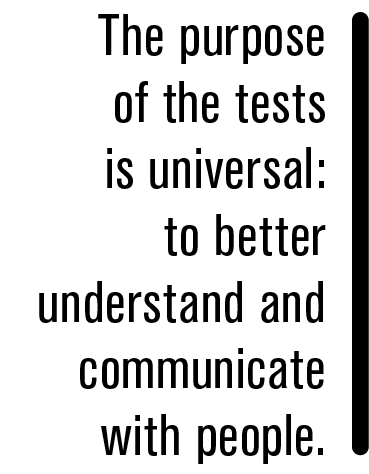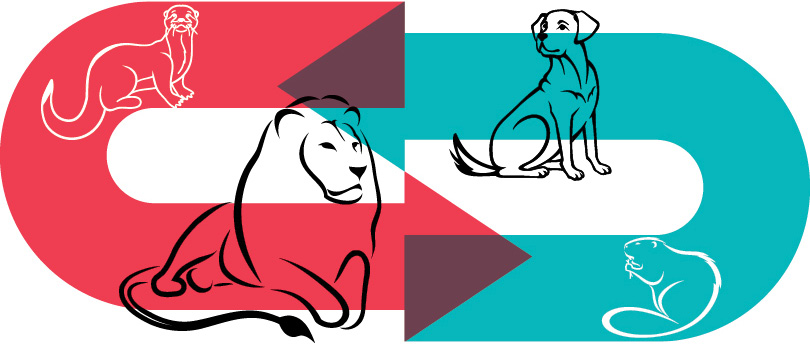The ability to work with different personality types is a skill that all agents should master
By Shaila Wunderlich
Within the first 20 minutes of meeting a client or colleague, Steve Rath, CRS, places them into one of four categories. “They’re either a driver, persuader, counselor or perfectionist,” says Rath, a broker with Better Homes Realty and 33 years of experience in the Sacramento, California, region. “And I can tell almost immediately.”
 Rath bases his assessments off the personality model known as DiSC, a well-known tool that tests and assigns individuals to one of four profiles. The profile monikers he uses are a slight variation of the DiSC acronym (dominance, influence, steadiness, conscientiousness), but the meanings behind each are the same. In fact, of the handful of personality models on the market today (Myers-Briggs, ABCD, Smalley-Trent, etc.) most measure individuals on a relatively universal scale. On one end, there is the independent, assertive, results-oriented ‘D,’ and on the opposite end is the cooperative, collaborative, sometimes-passive ‘S.’ Many people represent a combination of two or more.
Rath bases his assessments off the personality model known as DiSC, a well-known tool that tests and assigns individuals to one of four profiles. The profile monikers he uses are a slight variation of the DiSC acronym (dominance, influence, steadiness, conscientiousness), but the meanings behind each are the same. In fact, of the handful of personality models on the market today (Myers-Briggs, ABCD, Smalley-Trent, etc.) most measure individuals on a relatively universal scale. On one end, there is the independent, assertive, results-oriented ‘D,’ and on the opposite end is the cooperative, collaborative, sometimes-passive ‘S.’ Many people represent a combination of two or more.
The purpose of the tests is also universal: to better understand and communicate with people. In an industry like real estate, where clients hail from a limitless pool of demographics and backgrounds, it can provide a formidable edge. Susie Nelson-Crowley, CRS, with Coastal Properties Group & Christie’s International Real Estate, learned about personality profiles when she entered the Tampa, Florida, real estate market 20 years ago. “I was a heavy ‘D’ on the DiSC scale, and I was astounded,” says Crowley. “To think that I could be perceived as bowling over people in my intent to simply get where I wanted to go—that was mortifying.”
Crowley made a deliberate effort to soften her approach, and the results were immediate. “It was a game-changer. I wish I would have done it sooner.”
 Both Crowley and Rath agree the real edge comes in understanding the personalities of their clients and associates. By his second meeting, Rath has developed a business plan and communication strategy custom-tailored to his client’s specific profile. “If they’re a driver, I’m ready with an action-oriented plan laid out as briefly and succinctly as possible,” he says. “If they’re a perfectionist, I come with a binder full of data to hand over, ready to discuss it in depth.”
Both Crowley and Rath agree the real edge comes in understanding the personalities of their clients and associates. By his second meeting, Rath has developed a business plan and communication strategy custom-tailored to his client’s specific profile. “If they’re a driver, I’m ready with an action-oriented plan laid out as briefly and succinctly as possible,” he says. “If they’re a perfectionist, I come with a binder full of data to hand over, ready to discuss it in depth.”
At no point will personality profiles come in handier than in times of conflict and decision-making. This is when peoples’ personalities show themselves most clearly—as well as when they are most likely to shift personalities in attempt to achieve their desired outcome. “They called this a ‘Z Pattern’ when I first learned about it,” Rath says. “When things go wrong, people will jump from their true personality to another and another. The further they get from their true personality, the more uncomfortable they are.”
As REALTORS®, Rath and Crowley’s jobs are to make the client or colleague feel safe enough to return to their native personality.
Here’s a snapshot of some of the ways these veteran professionals pivot to their clients’ varying personality styles.
DOMINANCE (also known as driver, director or lion)
Sounds like: I need to get $800,000 on this listing, and we need it wrapped up in less than three weeks.
Respond with: I can get $750,000, and here are the listings in your area to back that up.
Says Rath: “If you can’t give them what they want, be prepared to prove why—and always be brief.”
INFLUENCE (also known as persuader or otter)
Sounds like: I can tell you’ve been in this business a long time.
Respond with: I like the way you think. What do you say we get you into this dream house of yours?
Says Crowley: “Chatty types typically fall into this bucket. They want this to be an enjoyable experience, not just a transaction. Give them the story of a property rather than just the factual details.”
STEADINESS (also known as counselor, supporter or golden retriever)
Sounds like: I love this place—are you sure we can get it? I should check with my family first.
Respond with: I know we can get it. Let’s gather the gang and get everyone on board.
Says Crowley: “You’ll often have couples where one is a ‘D’ and the other an ‘S’; you have to walk the line between boosting the confidence of an ‘S’ while also including the other party.”
CONSCIENTIOUSNESS (also known as perfectionist, contemplator or beaver)
Sounds like: I’m thinking about buying an investment property. What can you tell me about rentals in Oakland versus San Jose?
Respond with: Here are spreadsheets showing what rentals are going for in these two areas; what their upside potential is; and year-over-year trends for the past 20 years.
Says Rath: “Always be ready with tons of data at your disposal. The perfectionist doesn’t necessarily want to go to dinner and talk about it, but they want to understand it and trust it.”
Watch the recording “Selling Using the DISC Personality Profile” to learn more about how to communicate with different personalities, available at CRS.com/webinars.
Photo: iStock.com/Artem Novosad/Igor Petrovic/a_mayka/Naddiya








